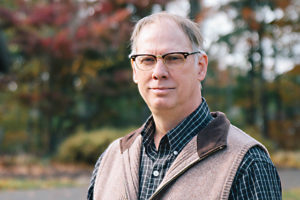Last month, the library reinstated an old tradition: asking faculty members to recommend a list of books, which are displayed in the library with annotated bookmarks tucked into their pages. The first of these book lists, which will be on display at the library until mid-March, was created by Professor of Art Ted Murphy.
“There’s nothing like walking into the library and seeing Professor Murphy’s face staring back at you from bookmarks,” said Matt Young ’18. Librarian Brad Wilber, who graduated from Houghton in 1991, said the Faculty Picks display is something he remembers from his time as a student. Murphy approached Wilber recently and suggested that the library revive this old tradition, saying that he had “enjoyed seeing what colleagues thought were books formative to their thinking and education.” Wilber responded with his own suggestion: that Murphy compile the first book list. Wilber said he hopes Murphy’s selections “will be something students and community members will gravitate toward.” The next Faculty Picks display will be compiled by President Shirley Mullen.

Some students have already found the Faculty Picks display to be a useful guide. Young noted that books lists “provide insight into the intellectual and emotional lives of people we admire or respect.” Wilber agreed, saying that the exercise of reading Murphy’s book list “has made me feel closer to him.” Tyler Stetson ’20 was also appreciative of the display, saying “I think the faculty recommendations at the library is an awesome idea, especially since there is a bookmark in each book explaining why the professor found it particularly worthwhile. This program shows that developing expertise such as Houghton faculty possess requires reading broadly and deeply.” Even though some students may not have the time in their schedules for extra reading during the semester, Wilber said he has noticed many students reading every annotated bookmark in the display. The annotations can also be viewed on the library’s website, a feature created by Librarian Doyin Adenuga.
Many of the books Murphy chose are philosophical in nature, ranging from works by Fyodor Dostoyevsky to Cormac McCarthy. Murphy said he enjoys reading books lists himself: “I like them as guides,” he said. Anthony Burgess’ list titled “The 99 Best Novels in English Since 1939” introduced Murphy to “authors [he] still finds unfamiliar to many serious readers of literature.” He noted significant examples: Olivia Manning, Brian Moore, Budd Schulberg, and Angus Wilson. A self-described “generalist,” Murphy was grateful to become familiar with the work of these writers.
Murphy reflected on the idea of the book list, observing that lists claiming to contain the best novels are “not looked upon well today in college literature.” He explained that there is “far too much hegemony at stake and the exclusivity of voice is a serious risk.” He then concluded lightly, “But I am a painter. I don’t have to worry about what I read in terms of the academy. No one is concerned that I don’t read enough in their particular ilk.”
Murphy made it clear that to him, reading is both a passion and a serious commitment. He spoke of the formative power books have in our lives, highlighting their ability to connect us to others. “Books, like all art, are conduits to other lives, he said. Further, he expressed that “Books have a life of their own…books branch out and connect you to the authors that inspired the novel you just read.”
Reading, however, does not come easily for Murphy. He explained that he reads very slowly, and said that “from what I have investigated I can be pretty sure I have dyslexia. A great many of the conditions clearly describe my struggles early on in learning to read.” Murphy reads about 30 pages a day, which “most of my students can do in a half hour. Me…it takes hours.” He said that his slow reading pace does have its benefits: “I tend to recall well what I have read. Ernesto Sabato’s El Tunnel, which I read 40 years ago, is still clear enough in my memory I feel confident I could take a quiz on it.” Murphy reads between 35 and 50 books each year, “but it requires a big commitment.”
This commitment has proved invaluable. “Reading has saved me,” Murphy said. “I am who I am in many ways because of the ideas books have exposed me to. I am lucky to have a job where I am essentially paid to read,” he said. For college-aged adults at a formative time of life, Murphy encouraged an exercise suggested by one of the writers on his list, Borges. “The first important thing an adult should do is establish a personal library. Buying a home and a car are typically what we think of as adults…Borges said it is the books you have brought into your life,” Murphy said. “I hope a few people will read some of what I have been most inspired by.”
